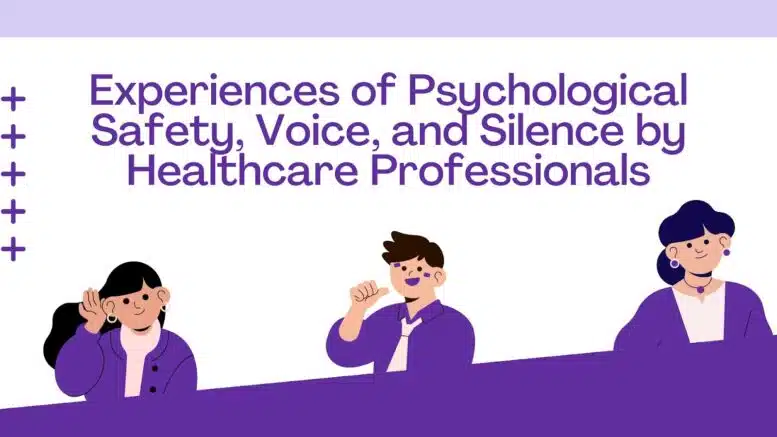Healthcare professionals often face challenges when it comes to psychological safety. That is why it is vital to check their mental health and well-being and provide them with the support they need.
But in many healthcare organizations, psychological safety in the workplace is not practiced. This can lead to a lack of open communication and a fear of speaking up for oneself.
This article will discuss how psychological safety, voice, and silence affect individuals. If you’re curious to know more about the topic, keep reading.
What is Psychological Safety on Healthcare Professionals
Psychological safety is how a person feels about how safe and comfortable they feel at work. It depends on how much they trust and respect their coworkers and whether they can speak up and share opinions.
Psychological safety at work is essential for healthcare workers. They work in high-pressure environments where making a mistake can have bad results. They must be able to talk to their team and be confident enough to make decisions when needed.
Medical providers are more likely to speak up and tell their team what they think and feel. This creates a trusting and respectful environment for healthcare workers. Making them feel heard and appreciated.
One way to improve communication and teamwork skills is through consultation and training. Rock the Boat is a leading provider of DEI consulting and training services. They offer a range of training and development programs for every individual.
The Impact of Voice on Healthcare Workers
Voice is a person’s ability to speak up and express their thoughts and feelings. This creates a trusting and respectful environment for healthcare workers. Making them feel heard can impact their sense of purpose and job satisfaction.
It is easy to notice problems and offer solutions when healthcare workers feel free to speak up. It leads to better patient outcomes when the issue is identified before it worsens. It is important to create effective teamwork in the workplace. This builds trust and respect when everyone works toward the same goal.
Giving constant support makes a strong foundation for healthcare professionals. That is why healthcare professionals work in teams with people from different fields.
These teams can include doctors, nurses, pharmacists, and other healthcare providers. To give high-quality care to patients, healthcare workers must work well together.
- Open communication is when they share information and know what to expect. And if there are any problems, they can discuss them and figure out how to solve them as a group. Effective communication can help prevent misunderstandings.
- Shared goals are working toward a common goal and coordinating their work. It allows them to collaborate, take responsibility, and feel like they have a purpose. Healthcare workers can feel that they are contributing to the team’s success.
- Mutual respect is essential to creating a positive environment between healthcare professionals. It builds a sense of care as well as empathy and understanding. Showing respect for each other is an important aspect of mutual respect.
- Trust and safety are critical components of teamwork. Medical workers rely on each other to deliver high-quality care. This can develop cooperation and improve performance. Trust helps workers feel confident in each other’s skills and knowledge.
But there may be times when healthcare workers feel like they can’t speak up. This can happen if they feel judged or criticized. They can lose their sense of purpose and, in the end, the quality of care they give to their patients.

The Effects of Silence on Healthcare Workers
Silence is the opposite of voice. It means someone is unwilling to speak up and tell others what they think and feel. Silence can cause many things, such as a lack of confidence or the idea that they are not needed.
In health care, keeping quiet can lead to bad things. They may be less likely to speak up when they see issues with how patients are being cared for. This can make care less than ideal and could hurt patients.
Creating a Culture of Mental Safety
A culture of mental safety means people can express their ideas without fear. Let’s take a closer look at each of these strategies.
Team Facilitation
Facilitators can lead exercises to improve communication and build trust among team members. This lets team members get to know each other better and build trust. It also makes it easier for team members to say what they think and worry about during a meeting or shift.
“Appreciation” is an example of a psychological safety exercise. In this activity, each person on the team says something good about another person on the team. It can boost morale and help people trust each other on the team.
Leading with Psychological Safety
Having a leader is essential for creating a safe culture. Leaders can show their team members how they want them to act. This means admitting you are wrong and getting other people to speak up.
Leaders should also be willing to listen to feedback and make changes based on that feedback. They can increase outcomes and safety for patients as well as the health of their staff members.
Model of Psychological Safety
The “Fearless Organization” is a book by Professor Amy C. Edmondson. The book is all about psychological safety in the workplace. It highlights the concept of mental safety within organizations and teams.
The book offers a psychological safety model that leaders can use. These include active listening, reframing, and appreciation inquiries. Following these exercises can promote a culture of psychological safety within healthcare teams.
Conclusion
Psychological safety, voice, and silence are important for healthcare professionals. They can speak their minds, be more creative, and make better decisions when they feel safe. It’s crucial for healthcare workers to feel safe when they speak up or stay quiet.
This helps the team work better and improves patient results. Leaders should also show safety and trust in the workplace. Giving feedback can involve the team in decision-making and being flexible. When health workers feel safe, they can communicate better and work well.
